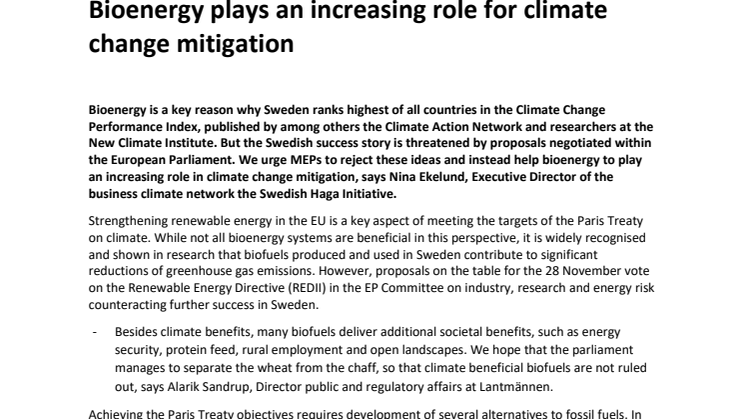Pressmeddelande -
Bioenergy plays an increasing role for climate change mitigation
Bioenergy is a key reason why Sweden ranks highest of all countries in the Climate Change Performance Index, published by among others the Climate Action Network and researchers at the New Climate Institute. But the Swedish success story is threatened by proposals negotiated within the European Parliament. We urge MEPs to reject these ideas and instead help bioenergy to play an increasing role in climate change mitigation, says Nina Ekelund, Executive Director of the business climate network the Swedish Haga Initiative.
Strengthening renewable energy in the EU is a key aspect of meeting the targets of the Paris Treaty on climate. While not all bioenergy systems are beneficial in this perspective, it is widely recognised and shown in research that biofuels produced and used in Sweden contribute to significant reductions of greenhouse gas emissions. However, proposals on the table for the 28 November vote on the Renewable Energy Directive (REDII) in the EP Committee on industry, energy and research risk counteracting further success in Sweden.
- Besides climate benefits, many biofuels deliver additional societal benefits, such as energy security, protein feed, rural employment and open landscapes. We hope that the parliament manages to separate the wheat from the chaff, so that climate beneficial biofuels are not ruled out, says Alarik Sandrup, Director public and regulatory affairs at Lantmännen.
Achieving the Paris Treaty objectives requires development of several alternatives to fossil fuels. In parallel with increased electrification of the transport sector, using climate beneficial biofuels is an important part of the solution, since these allow major emission reductions with present technologies. For example, Lantmännen Agroetanol produces ethanol with greenhouse gas savings of more than 90 percent and Preem plan to produce 3 000 000 cubic meters biodiesel and bio gasoline by the year 2030, using residues and waste mainly from the Swedish pulp industry and agriculture. Demand for these solutions is increasing since a number of years.
- It would be deeply regretful if climate solutions applauded by researchers and environmental organisations are blocked by politicians in the name of climate policy. I hope that the ITRE Committee ensures that each biofuel is regulated based on lifecycle emissions, not on speculations on arbitrary categories of fuels, says Helene Samuelsson Head of Corporate Communications and Public Affairs, Preem.
The Haga Initiative urges MEPs to adopt policies that support biofuels with low greenhouse gas emissions throughout their life cycle, but that do not restrict certain specific types of raw materials per se. Policies must moreover be long term and should allow new fuels that meet climate requirements to enter the market in the future.
- EU policy must draw the main demarcation line between climate beneficial biofuels and those fuels that increase greenhouse gas emissions. In particular all fossil fuels need to be phased out by 2040 at the very latest, in the entire EU, says Nina Ekelund, Executive Director of the Haga Initiative.
Press contact:
Nina Ekelund, Executive Director, Haga Initiative
mobile: +46735022 464
e-mail: nina.ekelund@hagainitiativet.se
Ämnen
- Företagande
The Haga Initiative is a business network that strives for a profitable business without climate impact. The network includes: AkzoNobel, Axfood, Coca-Cola European Partner Sverige, Folksam, Fortum Värme, Green Cargo, HKScan Sweden, JM, Lantmännen, Löfbergs, McDonalds Sweden, Preem, Siemens, Stena Recycling and Sveaskog.

